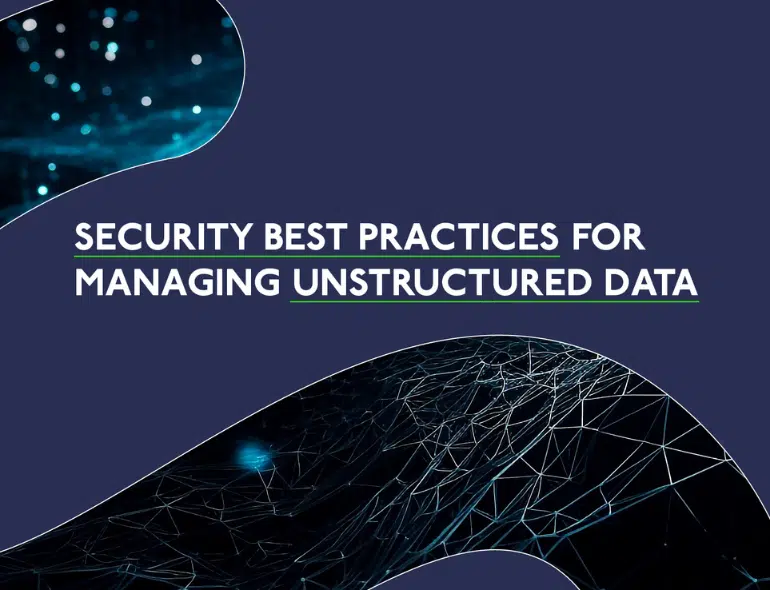In today’s data-driven business landscape, small and medium-sized businesses (SMBs) are dealing with an ever-increasing amount of unstructured data. According to Gartner1, unstructured data accounts for approximately 80% of all enterprise data, and this figure is expected to grow exponentially in the coming years. As a result, managing unstructured data securely has become one of the most critical IT challenges for businesses of all sizes.
Unstructured data refers to information that doesn’t have a pre-defined data model or organisation, such as emails, documents, videos, and social media posts. This data, while often valuable, is inherently harder to manage and protect, especially for SMBs that may not have the necessary expertise or resources in-house.
Failure to properly manage and secure unstructured data can result in severe consequences, including regulatory penalties, reputational damage, and financial loss due to data breaches. Recent reports from the International Data Corporation2 (IDC) show that businesses affected by a major data breach can incur an average cost of £3.5 million per incident. As the volume of data grows, the risk becomes even more significant.
Here are top 3 tips for managing unstructured data so that your business can stay ahead of these challenges, with services such as managed IT services, private managed cloud, data backup and disaster recovery.
- Implement Data Classification and Access Control
The first step in securing unstructured data is understanding what data you have and where it resides. Data classification involves categorising data based on its sensitivity and importance to the organisation. By classifying unstructured data, businesses can apply the appropriate security measures, ensuring that sensitive information such as customer data, financial records, and intellectual property is adequately protected.
Once data is classified, access control policies should be implemented. Access control ensures that only authorised personnel can access specific types of data. According to a study by Ponemon Institute, 62% of data breaches involve either compromised or stolen credentials3, making strict access controls essential for reducing risk. Role-based access control (RBAC) or least-privilege access principles ensure that users only have access to the data necessary for their role.
Synapse360’s IT-managed services can help your business with a free assessment and can implement robust data classification systems and access control policies, ensuring that sensitive data is only accessible to those who need it, thus reducing the risk of internal and external threats.
- Encrypt Data in Transit and at Rest
Encryption is one of the most effective ways to protect unstructured data. It ensures that even if the data is intercepted or stolen, it cannot be read without the proper decryption key. SMBs must ensure that their unstructured data is encrypted both at rest (when stored) and in transit (when being transmitted over networks).
Research from Cybersecurity Ventures suggests that encrypted data reduces the risk of breaches by as much as 80%4. With cyberattacks growing in both sophistication and frequency, encryption should be a mandatory security practice for all organisations. Additionally, encryption helps businesses comply with data protection regulations such as GDPR, which requires organisations to take appropriate measures to safeguard personal data.
Our managed cloud services are built with security in mind, offering built-in encryption for both data at rest and data in transit. By leveraging our secure infrastructure, your business can ensure compliance while safeguarding its valuable data assets.
- Regular Backups and Disaster Recovery Planning
Despite the best preventive measures, data breaches or loss incidents can still occur. In such situations, the ability to quickly restore data is crucial for minimising downtime and financial loss. According to a study by IBM, businesses that suffer significant downtime from data loss incidents can face costs averaging £6,000 per minute5. Therefore, regular backups and a comprehensive disaster recovery (DR) plan are essential for any organisation dealing with unstructured data.
Regular backups ensure that a current copy of your data is always available. However, the backup process itself must be secure to prevent it from becoming a target for hackers. Offsite backups in a secure, managed cloud environment provide an added layer of protection.
Our backup and disaster recovery services are designed to protect your unstructured data against loss, ensuring business continuity in the event of a cyberattack, hardware failure, or other disasters. Our solutions include automated, regular backups, secure cloud storage, and rapid data recovery, helping to keep your business running smoothly.
Managing and securing unstructured data is a significant challenge for SMBs, but it is essential for protecting your business from data breaches, financial loss, and regulatory penalties. By implementing data classification, encryption and regular backups, businesses can significantly reduce the risk of data loss and maintain the integrity of their information.
At Synapse360, we offer a comprehensive portfolio of managed IT services, including private managed cloud, data security, backup, and disaster recovery, to help your business secure its unstructured data and maintain regulatory compliance. Our expertise in IT security ensures that your business is protected against evolving threats while maintaining seamless operations.
To speak to one of our experts, or to book a free assessment of your IT environment, click here



